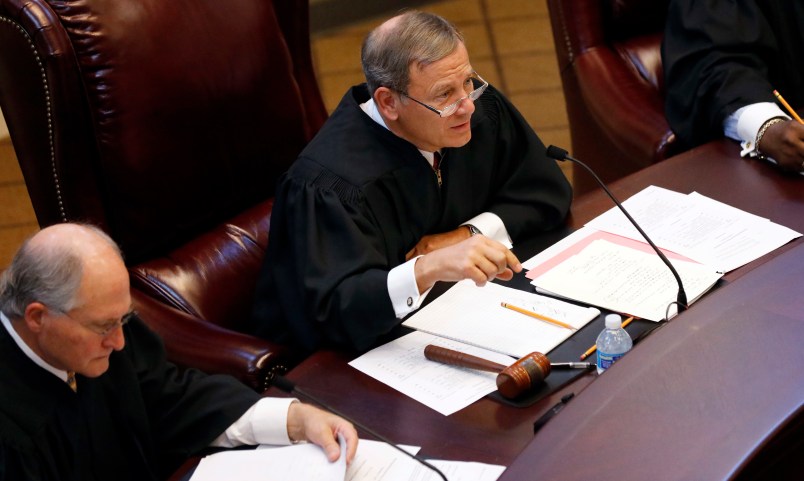Writing in his annual report on the judiciary, issued Sunday, Roberts touched only briefly on the issue of workplace sexual misconduct, which has in recent months brought down men in entertainment, politics and the media. In December, prominent federal appeals court Judge Alex Kozinski retired following accusations by women that he had touched them inappropriately, made lewd comments and shown them pornography.
“Events in recent months have illuminated the depth of the problem of sexual harassment in the workplace, and events in the past few weeks have made clear that the judicial branch is not immune,” Roberts wrote, without mentioning Kozinski by name.
Roberts had previously asked that a working group examine the judiciary’s workplace conduct policies, with a report expected by May 1. Roberts wrote that the group will examine whether changes are needed in a number of areas, from codes of conduct to the handling of misconduct complaints.
“I have great confidence in the men and women who comprise our judiciary. I am sure that the overwhelming number have no tolerance for harassment and share the view that victims must have clear and immediate recourse to effective remedies,” the chief justice wrote in the 16-page report.
Roberts spent most of the report talking about the judiciary’s response to this year’s devastating hurricanes, which affected Texas, Florida, Puerto Rico and the Virgin Islands, and also mentioned wildfires in California
Roberts praised judges and court employees in the Virgin Islands and Puerto Rico in particular, saying that after hurricanes Irma and Maria, they “responded in dedicated and even heroic fashion,” continuing to work “even in the face of personal emergencies.”
He said the judiciary has also learned lessons from the storms and will develop better backup communications systems and do more to position emergency supplies in areas susceptible to hurricanes and flooding.
Roberts said the judiciary must be ready for a range of potential disasters, such as earthquakes, cyberterrorism and terrorist attacks.
“The courts cannot provide food, shelter, or medical aid, but they must stand ready to perform their judicial functions as part of the recovery effort,” he wrote.
Roberts promises review of judiciary’s misconduct policies
Writing in his annual report on the judiciary, issued Sunday, Roberts touched only briefly on the issue of workplace sexual misconduct, which has in recent months brought down men in entertainment, politics and the media. In December, prominent federal appeals court Judge Alex Kozinski retired following accusations by women that he had touched them inappropriately, made lewd comments and shown them pornography.
“Events in recent months have illuminated the depth of the problem of sexual harassment in the workplace, and events in the past few weeks have made clear that the judicial branch is not immune,” Roberts wrote, without mentioning Kozinski by name.
Roberts had previously asked that a working group examine the judiciary’s workplace conduct policies, with a report expected by May 1. Roberts wrote that the group will examine whether changes are needed in a number of areas, from codes of conduct to the handling of misconduct complaints.
“I have great confidence in the men and women who comprise our judiciary. I am sure that the overwhelming number have no tolerance for harassment and share the view that victims must have clear and immediate recourse to effective remedies,” the chief justice wrote in the 16-page report.
Roberts spent most of the report talking about the judiciary’s response to this year’s devastating hurricanes, which affected Texas, Florida, Puerto Rico and the Virgin Islands, and also mentioned wildfires in California
Roberts praised judges and court employees in the Virgin Islands and Puerto Rico in particular, saying that after hurricanes Irma and Maria, they “responded in dedicated and even heroic fashion,” continuing to work “even in the face of personal emergencies.”
He said the judiciary has also learned lessons from the storms and will develop better backup communications systems and do more to position emergency supplies in areas susceptible to hurricanes and flooding.
Roberts said the judiciary must be ready for a range of potential disasters, such as earthquakes, cyberterrorism and terrorist attacks.
“The courts cannot provide food, shelter, or medical aid, but they must stand ready to perform their judicial functions as part of the recovery effort,” he wrote.







This AP repoert does not mention Clarence Thomas by name.
@thomasmatthew This AP repoert does not mention Clarence Thomas by name.
“Events in recent months have illuminated the depth of the problem of sexual harassment in the workplace, and events in the past few weeks have made clear that the judicial branch is not immune,” Roberts wrote,"
That’s because this is a recent problem, not some ancient history from almost thirty years ago. See how that works?
An article so nice, it’s been posted twice!
For Roberts to have any credibility on this one he needs to demand that Clarence Thomas resign or be impeached by the congress…if not for Joe Biden cutting off witnesses during Thomas’s congressional review hearings and he would have been disqualified as a rapist and for assaulting more women than Biden allowed the public to see and hear!
Clarence Thomas…resign now.
And the fox intoned solemnly that the issue of henhouse safety, having recently become a matter of concern among a great many chickens, would be examined with the level of empathy and gravity it warranted by a special council of concerned foxes.